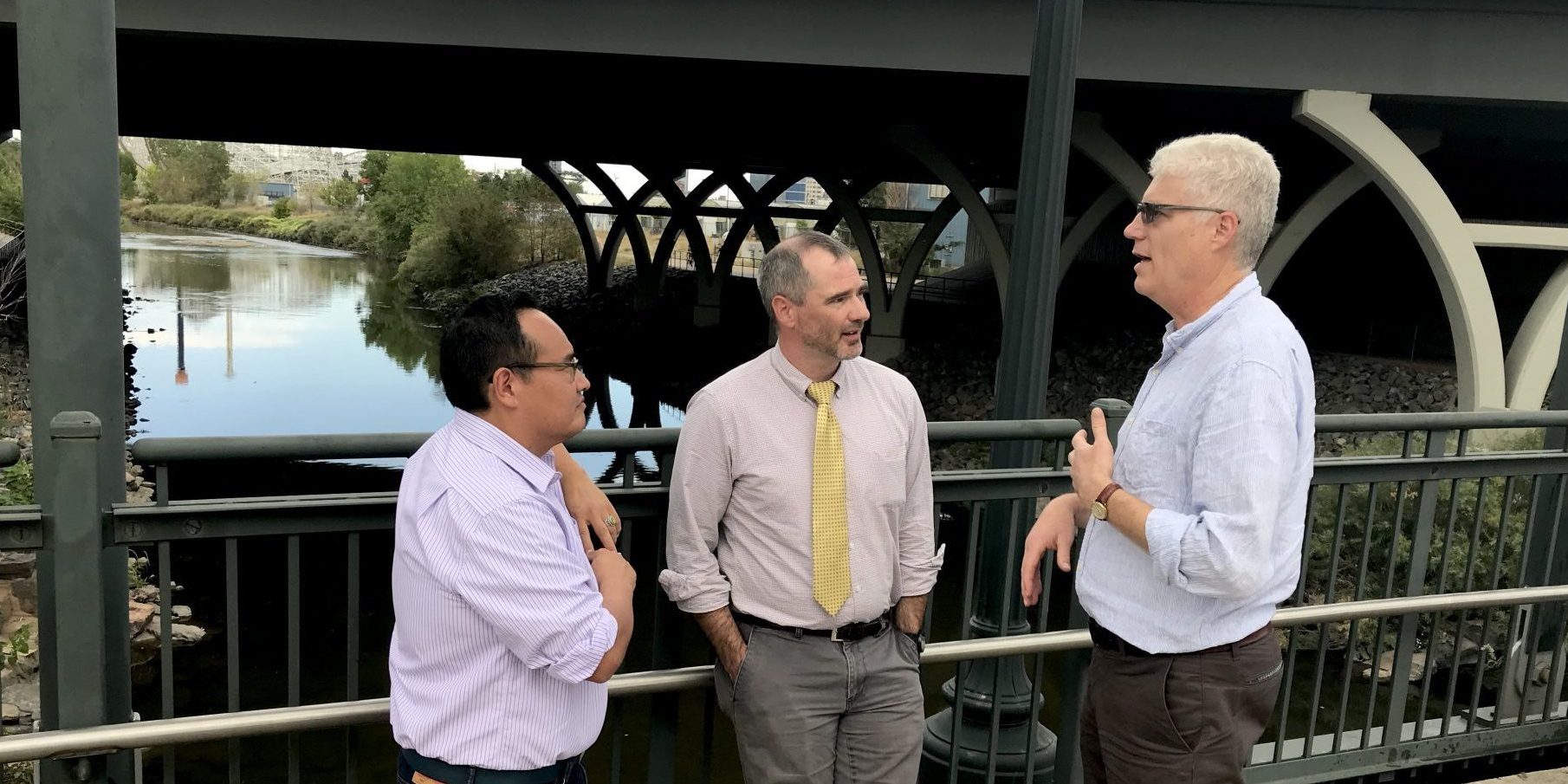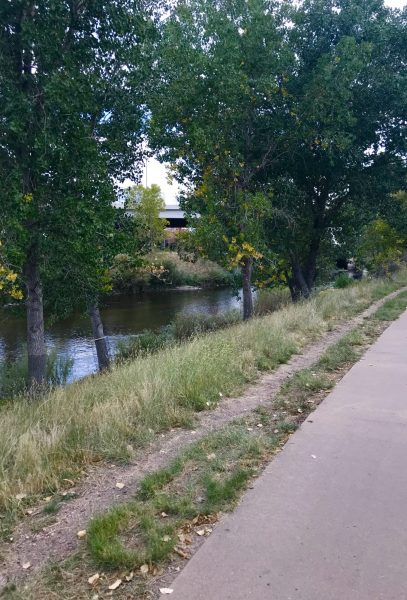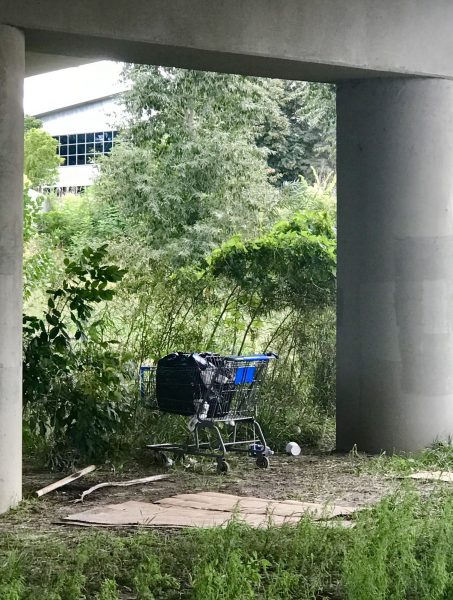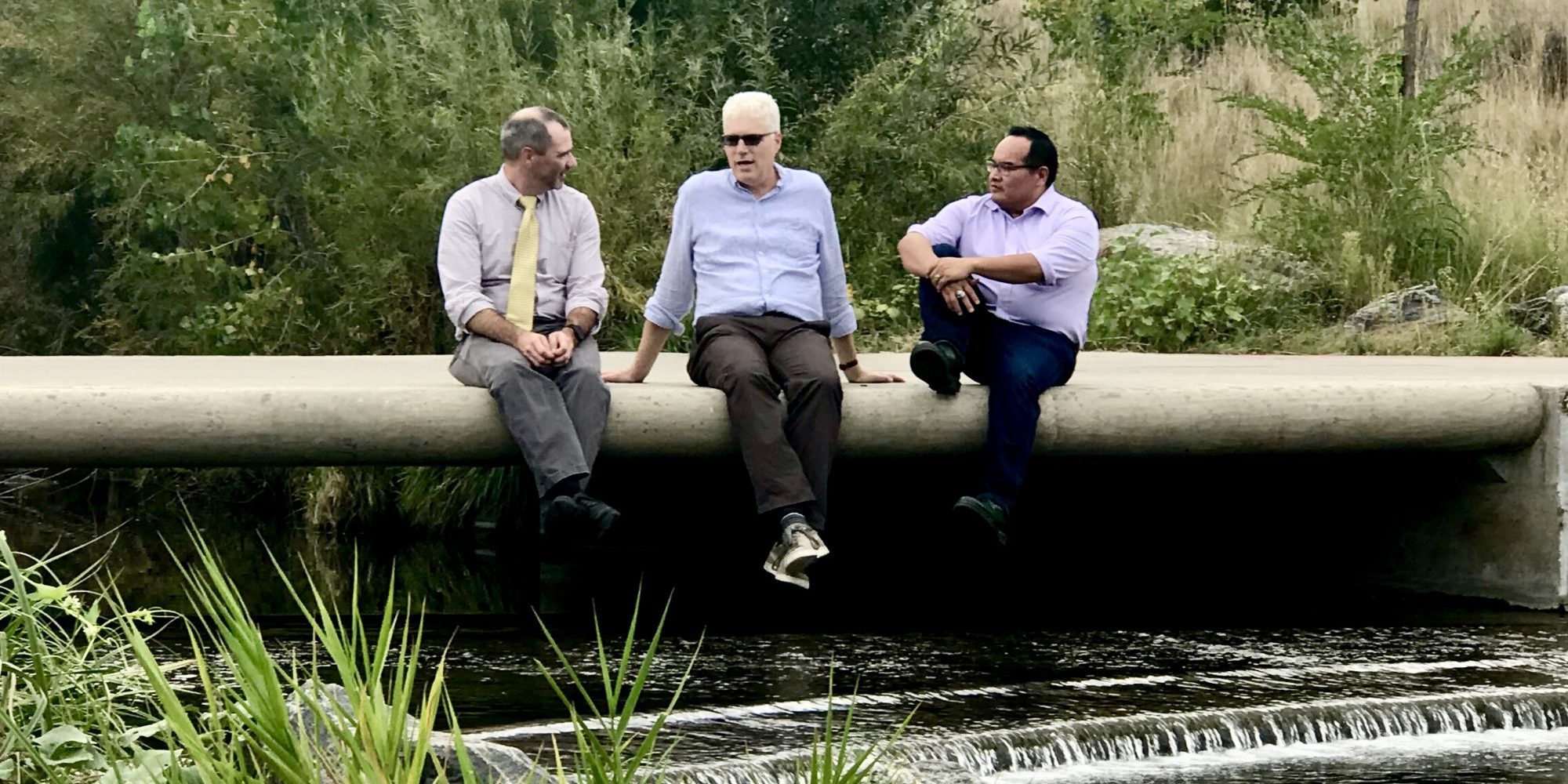Photo: Alumnus Christopher Conner (M.A. ‘11) and Communication Studies Professors Eric Aoki and Greg Dickinson
Prologue
One day a group of townspeople gathered beside the river to picnic and relax. Suddenly a baby came floating down the river, in danger of drowning. Then another. And another. The people rushed into the river, working to save the babies. Amidst the pandemonium, someone starts walking up stream. “Where are you going?” the rescuers scream. “This is an emergency! We need your help!!”
She replies, “I’m going to find out why babies keep falling in the river.”
— The Parable of the Drowning Babies
ACT I
From: Christopher Connor
Date: June 28, 2018 at 2:51 p.m.
To: Aoki, Eric; Dickinson, Greg
Subject: Little Update
Just a little update I thought I'd share...Months ago I was put in touch with a father who spent week in homelessness with his son. The father had written a very honest and poignant 30-page telling about addiction and homelessness. He wanted my help to build readership from political leaders. That wasn't going to happen, but I was able to use some of what I learned through my degree to consider other ways, means, and audiences that would help him advocate. In the end, we produced a week later for NPR's "Weekend Edition." So in the end thousands nation wide were touched through his story.
Best,
C
From: Aoki, Eric
Date: June 28, 2018 at 5:42:25 PM
To: Christopher Conner
CC: Dickinson, Greg
Subject: Re: Little Update
Christopher,
Thank you for your continued and dedicated work to get often-marginalized voices and human experiences heard and connected into our larger public. Your engaged work continues to make a world of difference in how we see each other and how we learn about issues and concerns of social life. Thank you also for your continued use and acknowledgement of the lessons learned through your academic homes, including CSU and shared department. I smils broadly in recognition of how much you have gifted back with your nurtured skills, dedicated work, and amazing gracious human spirit.
Respectfully,
Eric

ACT II
Chris Conner is standing with Eric Aoki and Greg Dickinson on a pedestrian bridge that crosses the South Platte River near Colfax Avenue. They’ve been following a paved river trail north from its intersection with the Lakewood Gulch trail for one mile.
Aoki and Dickinson, Conner's mentors and former communication studies thesis advisors, have driven south to Denver at my request to further a conversation Conner and Aoki began in their email exchange. I want to know more about the influence Conner’s degree has had in his career.
In August 2018, Conner (M.A. ‘11) became director of Denver’s Road Home, which coordinates and oversees shelter services and invests city funds in nonprofits providing direct services to people experiencing homelessness.

Conner’s office is a five-minute walk to the South Platte River. Frank, the father whose 30-page document Conner transformed into a dramatic public reading, camped with his son Tommy, less than a mile downstream from where the trio stands.
Conner gestures across the bridge to the Colfax overpass at I-25 and mentions his thesis introduction. It describes the graffiti-marked overpass and an adjacent, vacant lot that was littered with used hypodermic needles. When Conner wrote his thesis – nearly eight years after finishing his graduate coursework – he was three years into what has become a career dedicated to improving the lives of people experiencing homelessness.
In the daylight, trail users bike and jog around us. Looking south from the bridge where we’ve stopped, there is little to outwardly mark the banks of the South Platte as a place of nocturnal remove for people with no home. In September the water is shallow and clear.
But the water is deep enough to harbor a dead body.
Two weeks ago Conner says he saw a fire department extraction team removing one on the east side of the river. He had been on a lunchtime run with colleagues, noticed the activity, and circled back to inquire if the deceased was an individual in homelessness. Yes, but cause of death unknown.
ACT III
“Chris was always interested in rhetorical constructs and theories, using them to observe and understand the world around him,” Dickinson told me on our drive south to meet Conner.
Dickinson and Aoki are trying to recall how many years it’s been since Conner started and finished his degree. We later learn from Conner that he took an 8-year break between his graduate studies and writing his thesis about communication strategies between two populations of people experiencing homelessness: intravenous drug users (IDUs) shooting heroin and non-IV drug users (NIDUs).
Conner gained access to IDUs experiencing homelessness through his work with Break the Cycle, an intervention program that attempts to provide strategies for active IDUs to avoid initiating new people to injection drug use. Then he developed a rigorous ethnographic research method and recruited five IDUs experiencing homelessness for one-on-one interviews.
His analysis and discussion of interviewee responses used several classic rhetorical concepts. Of interest to me is his discussion of types of knowledge: techne and phronesis.
Techne is the practical “how to” do something -- such as, how does one “technically” inject heroin? Phronesis, on the other hand, layers the “how to,” with “how much,” “how often,” and “how come.” It is practical knowledge imbued with wisdom.
I think about Conner’s approach to helping Frank find a platform for his message. He recognized that Frank’s story needed an audience. So, why not turn the story into a live monologue? Much of the story takes place in and around Denver’s Civic Center Park. So, why not stage the reading at a city venue imbedded in the same park? One of the first people Frank met in Civic Center Park was Pastor Jerry Herships. Conner knew Herships had a previous life as a stand-up comic in L.A. So, he suggested that Herships play Frank.
Phronesis is a foundational quality to Conner’s work with, and in service to, people experiencing homelessness.
ACT IV
Since 2007 Conner has worked in the area of homelessness in a variety of capacities: as a needle exchange volunteer; as a street outreach case manager for Denver’s Urban Peak, which serves individuals 25-years and younger; a volunteer with Break the Cycle; and, as a program administrator with Denver’s Road Home.
“What is it that drives you to continue to sustain and maintain a connection for the kind of work you are doing?” Aoki asks Conner.
Frustration, he says. “From there I can really produce energy to do this work.”
We pass an abandoned shopping cart sidelined off the trail under an overpass. Conner is reminded of the drowning babies parable, what he calls “folklore” often told among people doing caretaking or crisis prevention work involving issues deeply in need of systemic change. He identifies strongly with the tension this parable reveals. Save babies or walk upstream?
But it’s not an either/or choice for Conner. Like a bridge, he spans both spaces.
“Those points of frustration and anger really drive my work to commit within a system to do what I can with the tools available,” he tells Aoki and Dickinson. “Even if it is working on a homeless shelter network when what we really need is a home for everyone.”
The work is concurrent: keep people afloat while identifying upstream policies that prevent them from falling in the river, such as re-thinking shelter programming.
He points to a large increase in employed individuals staying in shelters because wage stagnation and income disparities have cut them out of other housing opportunities. Meanwhile, there’s also been an uptick in the needs of aging seniors, particularly women, because options for nursing care are scarce.


ACT V
Conner must return to his office and head to a neighborhood meeting. But we linger a while where the trail crosses a landscaped section of Lakewood Gulch. Aoki says this will be a good spot for photos, which I am taking of the trio to commemorate the day. They sit down on the edge of trail, legs dangling toward the creek.
I hop stone pavers that bank the gulch and kneel among the grasses hoping to frame the men talking and gesturing. I can’t hear their conversation over the sound of the creek, gently flowing downstream.
I rejoin them. Aoki tells Conner about our drive south and a question I had posed to Dickinson and him: what had Conner taught them during his time as a grad student?
“At some level you were someone who got me to think about intersectionality before intersectionality was something we were talking about,” Aoki says. “There were so many variables of identity going on in the individuals you were working with.”
Conner thanks him for the insight, then pauses and thanks them both for their willingness to continue advising him long after he had left the program.
I don't want the conversation to end, but Conner’s next appointment demands his attention, and it’s time for all of us to walk up stream.
